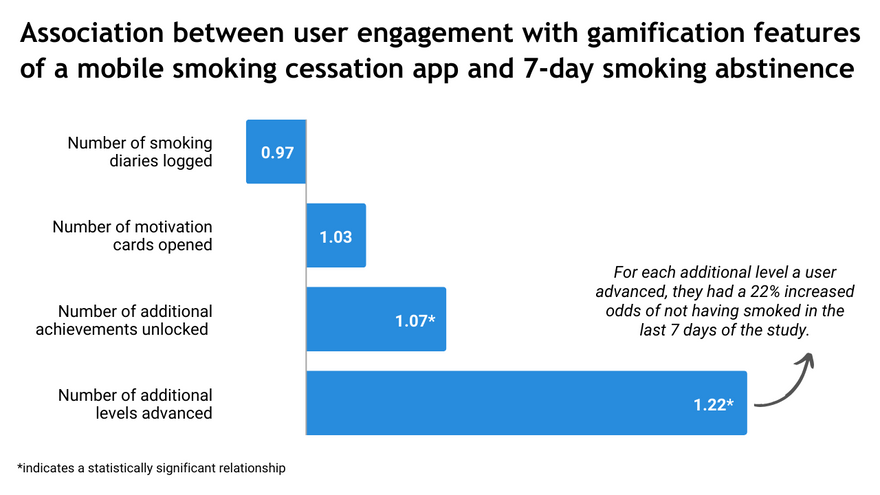ASHES, Vol. 20(6) – Gamification in a smoking cessation mobile app: User engagement and short-term abstinence
Gamification is the integration of immersive and entertaining gaming elements—like badges, points, and rewards—into non-gaming contexts. It is used in digital health and wellness interventions to encourage user engagement and motivate behavior change through rewards and incentives. This week, ASHES reviews a study by Nikita B. Rajani and colleagues that investigated whether user engagement with gamification elements in a smoking cessation app is associated with short-term smoking abstinence.
What was the research question?
Is engagement with gamification features in a smoking cessation app associated with increased odds of abstinence in the short term?
What did the researchers do?
Kwit is a mobile app that uses gamification to assist users in quitting smoking. Forty-four smokers who were actively trying to quit smoking used Kwit at least once a week during the four-week study period. The researchers tracked user engagement with various gamification features1 using in-app metrics. These metrics included the number of (1) times the app was opened, (2) smoking diaries logged, (3) motivation cards viewed, (4) levels completed, and (5) achievements unlocked. At the end of the study, participants reported whether they had smoked during the past seven days. The researchers used logistic regression to examine the association between user engagement with the various gamification features and seven-day smoking abstinence.
What did they find?
At the end of the study, nearly one-third of participants (n = 13) reported having abstained from smoking during the past seven days. Participants opened the Kwit app an average of 31 times (SD = 39) over four weeks. Smoking diaries and achievements were the most-used gamification features, with an average of 23 smoking diaries logged and 22 achievements unlocked per user. The average participant opened eight motivation cards and advanced eight levels during the study period.
Each additional level that a user advanced was associated with a 22% increase in the odds of seven-day smoking abstinence (see Figure). The number of achievements unlocked was also associated with abstinence, whereas the number of diaries logged and motivation cards opened were not.

Figure. Odds ratios of the association between user engagement with gamification features of the Kwit mobile smoking cessation app and seven-day smoking abstinence. Asterisks indicate a statistically significant relationship. Click image to enlarge.
Why do these findings matter?
Despite their widespread availability, engagement with mobile health apps can be low. Previous research has found that gamification may increase engagement with these technologies. Results from this study support that finding, and extend it to gamified smoking cessation apps. Findings also suggest that the clearest gamification features—achievements and levels—can increase likelihood of short-term smoking abstinence. These findings are particularly important because digital health and wellness technologies are a cost-effective and efficient method for delivering health interventions to people who face barriers to accessing in-person services.
Every study has limitations. What are the limitations of this study?
This study examined the association of engagement with gamification features and short-term smoking abstinence; the relationship between gamification and long-term smoking cessation is unknown. Smoking abstinence was measured by user self-report, which may be subject to biases (e.g., social desirability bias and recall bias).
For more information:
SmokeFree offers tools and tips for quitting and maintaining abstinence from tobacco use. The Centers for Disease Control and Prevention also provides research and tips about cigarettes and how to quit. For additional self-help tools, please visit the BASIS Addiction Resources page.
— Kira Landauer, MPH
________________
1. Smoking diaries allow users to log cravings and triggers. Motivation cards provide encouraging messaging for users during their quit journey. Kwit has 28 levels; users advance to the next level when they reach goals (e.g., not smoking for a determined length of time). Kwit has 72 achievements that users can unlock across various categories (e.g., health, money, time).